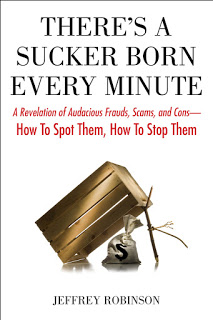1. If you didn’t enter the contest, you didn’t win it. No matter what anybody says about how the prize giver got your name, there is no such thing as a company you never dealt with, or person you never met, being so generous that all they want to do is give you something for nothing.
2. Your bank account is yours. If you let someone – especially a stranger – get close to it, they will steal from you. There is no reason for anyone to deposit money into your account, unless it’s going to be your money. Anyone who wants to put money into your account, and then ask you to take it out on their behalf, is a crook.
3. Friends who call you on the phone are friends. Strangers who call you on the phone are strangers. You wouldn’t give a perfect stranger who knocked on the door your credit card information; the stranger on the phone – or the stranger emailing on the Internet – is no different.
4. If a stranger on the phone asks to speak to the man of the house and there isn’t one, the woman of the house should say, whatever it is, “We’re not interested,” and hang up. A woman should never admit she lives alone.
5. Never sign anything that you haven’t read thoroughly and, where need be, shown to a lawyer or a close relative. No legitimate deal has to be signed for right away, regardless of how friendly the salesman seems to be.
6. If you’re contracting with someone to do some work, check first with the local Better Business Bureau to make certain that the business is trustworthy. If they are, they will offer you a contract, which you should then have a lawyer read. If they are not, they’ll try to talk their way around the contract and then ask for a fee up front. Legitimate companies don’t do that.
7. There is no such thing as a legitimate investment that pays ten, twenty, or thirty times the current bank interest rate. The person offering you a guaranteed 2%, 3%, 4%, or 5% a month is a thief.
8. Never borrow money for any reason without letting a lawyer look at the terms of the deal.
9. Shred everything that has your name, address, Social Security number, or any financial information on it. Before throwing anything away – such as bills, notices, statements, and personal mail – shred it. Shredders are cheap, and identity theft, which can happen if a thief can find out who you are going through your garbage, can be financially lethal.
10. Don’t discuss your life with strangers on the phone, even if they know your name. Just hang up. Use Caller ID to see who’s calling. Or screen calls with an answering machine. If you get a lot of unsolicited calls, sign up for the National Do Not Call Registry. It’s free. Being on the registry won’t solve everything but it will help.


No comments:
Post a Comment